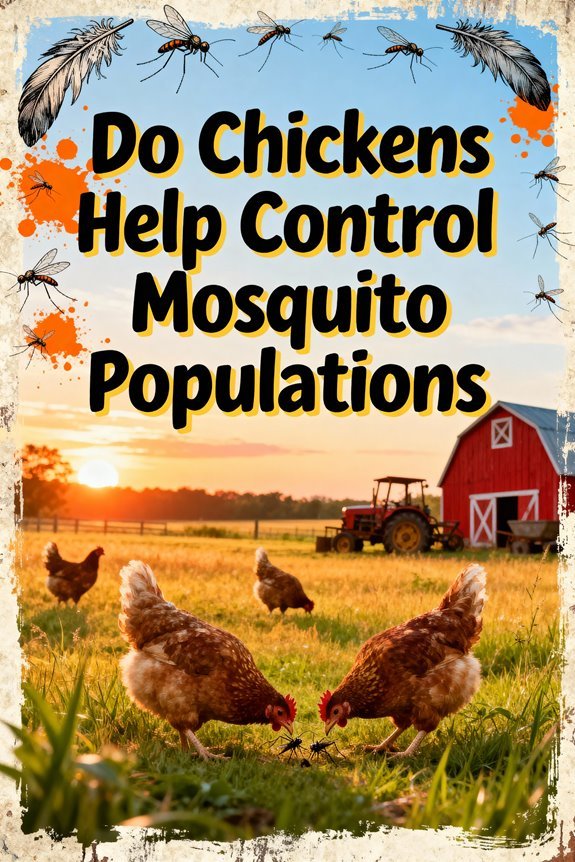While chickens can contribute to mosquito control through opportunistic feeding on adults and larvae, they aren’t a thorough solution. You’ll find their effectiveness varies based on environmental conditions and mosquito species present. Research shows that Anopheles arabiensis mosquitoes actively avoid chickens due to natural repellent compounds in their feathers. For meaningful mosquito reduction, you’ll need to combine chicken predation with targeted environmental management strategies that address breeding sites and adult populations.
The Science Behind Chickens and Mosquito Control
While many mosquito species actively seek human blood meals, research has shown that Anopheles arabiensis mosquitoes specifically avoid chickens both indoors and outdoors due to natural repellent compounds. These mosquitoes, which primarily use olfactory cues for host location, detect distinct chicken odors emitted from feathers that greatly reduce mosquito attraction. Scientific experiments have demonstrated that mosquito traps containing chicken scents capture fewer insects compared to control traps.
You’ll find that this natural avoidance mechanism has practical applications in mosquito control. The identification and isolation of these chicken-produced compounds could lead to new repellent formulations, particularly effective against pesticide-resistant populations. This offers a sustainable alternative to traditional chemical controls, as these natural odorants can be incorporated into mosquito management strategies without harmful environmental effects. This research is especially significant given that Sub-Saharan Africa accounts for nearly 90% of global malaria deaths.
Natural Predation vs. Targeted Treatment Approaches
Beyond the chemical repellent properties of chickens, understanding their role as natural predators versus targeted treatment methods provides key insights for effective mosquito control. While chickens and other natural predators like guinea fowl contribute to pest regulation through ground-level foraging, they’re limited in controlling adult mosquitoes, especially during peak nighttime activity. This is particularly noteworthy since bats eat 1,000 mosquitoes per hour during nighttime hours. You’ll find that targeted treatments often yield more immediate results. Essential oil sprays and mechanical interventions like fans can effectively deter mosquitoes without harming beneficial insects. When managing mosquito populations, you’ll need to combine natural predation with environmental controls, focusing on eliminating standing water and managing vegetation. While chickens play a role in general pest control, they shouldn’t be relied upon as your primary mosquito management strategy.
Using Treated Chickens as Mosquito Control Stations
Sentinel chickens serve as sophisticated biological monitoring stations in the fight against mosquito-borne diseases. These chicken sentinels develop antibodies that alert officials to viral activity before human cases emerge, enabling targeted control measures in specific areas. Weekly blood sampling detects antibodies for diseases like West Nile Virus and Eastern Equine Encephalitis. The chickens’ blood samples help trigger high-priority mosquito control in affected locations.
You’ll find that treating chickens with ivermectin effectiveness varies. While systemic treatment can increase mosquito mortality after blood-feeding, the effect is short-lived. Serum concentrations must exceed 5 ng/mL to achieve lethal effects, but levels drop quickly. Alternative treatments like fluralaner show promise but face similar duration limitations. These treated chickens work best when strategically placed in diverse ecological zones, though mosquito immigration and environmental factors can complicate their impact on local vector populations.
Real-World Impact on Disease Prevention
Three decades of field data demonstrate that chicken-based surveillance systems considerably reduce mosquito-borne disease outbreaks through early detection and rapid response protocols. When you implement sentinel monitoring programs, public health officials can detect arboviral activity before human cases emerge, as chickens develop antibodies without becoming ill themselves. Disease forecasting becomes more accurate when you combine chicken seroconversion data with mosquito trap counts and environmental factors. You’ll find that positive virus detections in sentinel chickens trigger immediate control measures, including targeted insecticide applications and community-wide prevention efforts. Programs like those in Indian River and Pinellas County, Florida, have proven that sentinel chicken surveillance provides vital lead time for implementing vector control strategies, ultimately reducing human infection risks. The ELISA testing method enables rapid screening of chicken blood samples to detect West Nile Virus antibodies, allowing for swift response to potential outbreaks.
Best Practices for Backyard Mosquito Management
Successfully managing mosquito populations in your backyard requires implementing multiple control strategies targeting different life stages of these disease vectors. Your backyard maintenance should focus on eliminating standing water in containers, birdbaths, and clogged gutters where mosquitoes breed. Install Bti dunks in undrainable water features and maintain grass below two inches to reduce adult resting sites.
While practicing habitat preservation for beneficial predators, install birdhouses and create environments that support natural mosquito enemies like bats, dragonflies, and amphibians. Use physical barriers such as intact window screens and outdoor fans to prevent mosquito access to living spaces. Regular monitoring of your property helps identify new breeding sites quickly, allowing for prompt intervention before mosquito populations establish themselves. Consider scheduling outdoor activities to avoid dawn and dusk when mosquitoes are most active.





